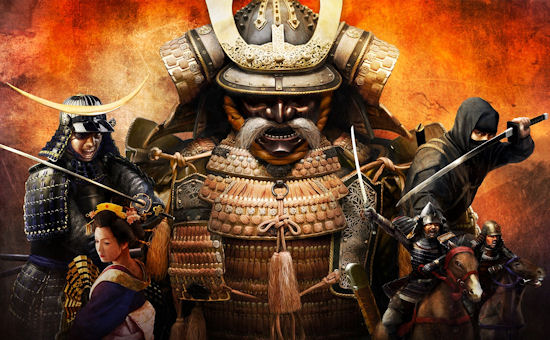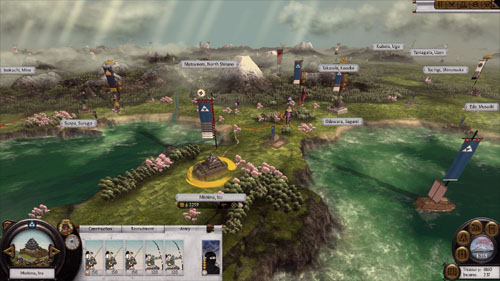

I’ve been pretty excited about Shogun 2: Total War since I saw it for the first time at a SEGA Event last Fall. I dabble very casually in RTS games, and the ones I play tend to have more RPG elements integrated in them. I seldom play them competitively, preferring single-player and comp-stomp with friends. As such, though I’ve heard many, many good things about the Total War games over the years, it was a series I had never gotten around to playing, despite the fact that co-op campaigning was introduced in their last game, Napolean: Total War. Upon seeing the game in action last fall, however, as well as learning just how the co-op campaigning worked AND put it in a feudal Japan setting (a setting that’s near and dear to my heart) - well, let’s just say I was quite intrigued.
At the beginning of the game, you pick one of nine clans (or ten, if you got the limited edition) available to you. Each clan has particular strengths. For example, a clan may get a bonus to particular type of unit or agent, or a particular clan may be the only clan who gets access to a certain unit. From there, you’re thrust into feudal Japan in a state of complete war as a massive number of clans fight to become the next ruling family.
Shogun 2: Total War is basically composed of two different types of gameplay, one turn-based and the other RTS. The turn-based half takes place on a huge map of Japan divided into a ton of different territories. Each individual territory starts off with a specific clan ruling over it. Clans can form alliances, make uneasy treaties, or wipe each other out. In a short campaign you win by conquering 25 territories by the end of the era (which must include several specific territories), while in a long campaign you win by conquering 40. A domination campaign dictates you control 60 territories by the end of the era! The co-op campaign works the same way as the single-player campaign: jointly, you and your partner must control the specified number of territories to win the game. You are automatically allied and cannot declare war on each other.

This has got to be one of the most gorgeous world maps ever seen in a strategy game.
On the campaign map you build up your cities, recruit units, move your armies around to initiate assaults, and much more. You can recruit agents (such as ninja) which can spy and assassinate for you, sow dissent in enemy cities to make them ripe for your army’s plucking, or apprehend other clan’s agents. All of these agents level up and have access to agent-specific skill trees which increase their effectiveness in certain areas (e.g. you can choose to have your ninja specialize in assassination or city subterfuge). You can also pick overall traits for your Clan’s reign in the form of two trees: the Way of Chi and the Way of Bushido. Each of these trees contains a large amount of arts, which, upon being gained, do things such as open up the possibility to recruit certain units, or improve the effectiveness of certain units or agents.
As far as diplomacy goes, there are both internal and external forms. There’s a straight-forward diplomacy window you can open whenever it’s your turn to enter negotiations with any other clans you have encountered. This window is quite similar to the one found in Civilization games. Here you can make offers and counteroffers, anywhere from declaring a peace treaty or declaring war to demanding or offering hostages of a clan’s ruling family. You can strengthen your alliance with another clan by arranging a marriage between the two families, or you can set a clan against another by agreeing to a peace treaty only if they declare war on one of your enemies.
When you attack a city or another army, you get two options for how you want to progress with the battle. You can auto-battle, which has the computer weigh the strength of the two forces and declare the outcome, or you can take it to the battlefield for the RTS portion of the game. I’ve dabbled a very small amount in this part of the game - enough to know it’s challenging and suitably complex, but I’m by no means an expert at it. Part of this is because the campaign map portion of the game is more than enough of a game by itself (trust me, gaining control of all those territories takes a ton of strategy and time without worrying about actually fighting the battles as it is).
UPDATE: While I originally thought that co-op isn’t always fully supported on the battlefield, this isn't really the case. When your army clashes with another army and you decide to take it to the battlefield, at first it appears that your co-op partner can spectate the fight, but won’t be able to actually participate as he or she has no units invested in the fight. However, you can gift some of your units to your co-op partner so they can play with you. There is also the potential opportunity, for both of your armies be on the battlefield: when one of you is reinforcing the other one in an attack against an enemy. To do this, however, your armies must be pretty much right up on each other on the campaign map when one of you attacks. For my and my partner’s play-style, mirroring our armies seems ineffective, so we skipped this option. We were having an excellent time purely playing the game on the campaign map. Though some die-hard RTS’ers may disagree, I think the auto-battle option is a great idea so people have a choice between a pure strategy game and a strategy game with real time strategy battles. It really opens up the game to a wider group of players.
I only really had one other small complaint with the game, and it’s mostly a complaint inherent to any turn-based game played cooperatively. During the turn-based portion of the game, you and your co-op partner each have your own turn. While you certainly aren’t stuck not being able to do anything at all during your partner’s turn (e.g. you can check out all your cities, queue up recruiting, browse the in-game Encyclopedia, etc.), there were times where I found myself out of things to keep myself busy with. Again, this was pretty minor, and many potential problems surrounding this could simply be cleared up if you and your co-op partner are courteous of each other and try to make your turns as quick and efficient as possible.
In conclusion, Shogun 2: Total War completely met my expectations and even exceeded them in some areas. I still feel as if I’ve barely scratched the surface of the potential depth of the game. The great thing is that you can get by with the basic knowledge, but greater potential is there if you want to pursue it. For example, I’ve hardly experimented at all with the monk agents, but if I chose to utilize them more, I’m sure I’d be well-rewarded for my effort. There’s a ridiculous amount of time you could sink into this game and it’s infinitely replayable. If you have any interest in co-op strategy games, Shogun 2 is an extremely well-crafted game with impressive graphics and an astounding amount of depth.